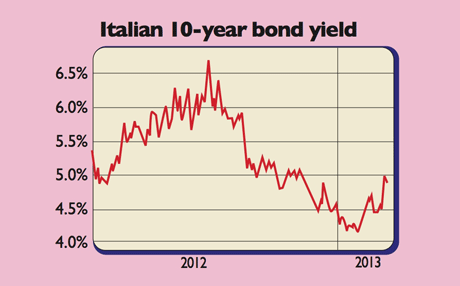
Market confidence took a nasty knock this week. On Tuesday, major stock markets slid by 1%-2% and yields on European sovereign debt jumped as a hung parliament in Italy’s election signalled a return of the euro crisis.
Italy’s ten-year yields jumped to a four-month high around 4.9% and other peripheral yields followed them up. Markets recovered some poise midweek when US Federal Reserve chairman Ben Bernanke signalled that US money printing wouldn’t end anytime soon.
What the commentators said
“There is… something about Italian politics… which induces a state of chronic desperation,” said The Guardian. This election was no exception. Centre-right leader Silvio Berlusconi is accused of a dalliance with an underage prostitute. An anti-establishment blogger-comedian, Beppe Grillo, now heads the largest parliamentary force in terms of votes cast. What rattled the markets, however, is that the vote produced “a legislative majority disinclined to bow to Europe’s demands”, said Tony Barber in the FT.
“This is a contender for being the most hazardous election result yet in the history of the eurozone,” said Julian Callow of Barclays Capital. With the structural reforms of the previous government looking highly unlikely to continue, fears over Italy’s solvency could flare up again. And Italy may be the biggest worry, but it’s hardly the only one.
“The euro isn’t safe until growth returns in southern Europe,” said Charles Grant of the Centre for European Reform. But there is scant sign of that. Deep recessions “are exerting consistent and intense pressure on governments”, said Economist.com. “For the crisis to remain in check, political systems in every country must withstand that pressure.” Unfortunately, “there are quite simply too many ways for things to go wrong”.